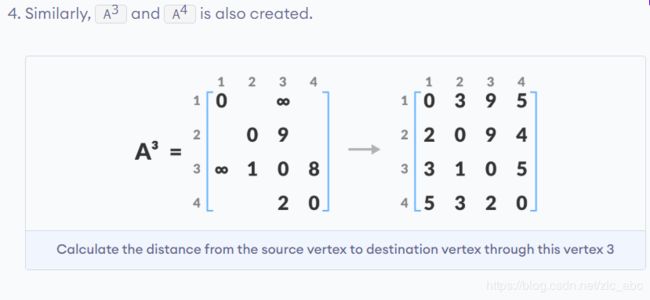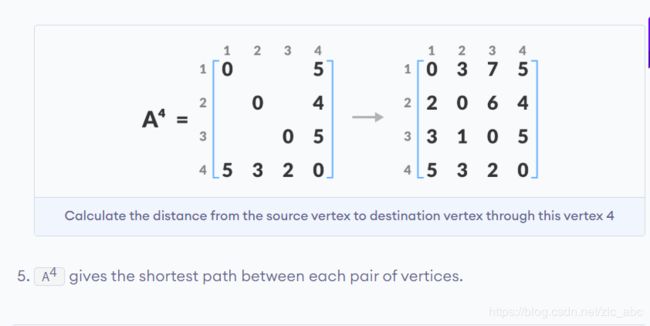Floyd-Warshall Algorithm介绍及各语言搜集比较
Floyd-Warshall Algorithm is an algorithm for finding the shortest path between all the pairs of vertices in a weighted graph. This algorithm works for both the directed and undirected weighted graphs. But, it does not work for the graphs with negative cycles (where the sum of the edges in a cycle is negative).
A weighted graph is a graph in which each edge has a numerical value associated with it.
Floyd-Warhshall algorithm is also called as Floyd’s algorithm, Roy-Floyd algorithm, Roy-Warshall algorithm, or WFI algorithm.
C
// Floyd-Warshall Algorithm in C
#include C++
// Floyd-Warshall Algorithm in C++
#include Python
# Floyd Warshall Algorithm in python
# The number of vertices
nV = 4
INF = 999
# Algorithm implementation
def floyd_warshall(G):
distance = list(map(lambda i: list(map(lambda j: j, i)), G))
# Adding vertices individually
for k in range(nV):
for i in range(nV):
for j in range(nV):
distance[i][j] = min(distance[i][j], distance[i][k] + distance[k][j])
print_solution(distance)
# Printing the solution
def print_solution(distance):
for i in range(nV):
for j in range(nV):
if(distance[i][j] == INF):
print("INF", end=" ")
else:
print(distance[i][j], end=" ")
print(" ")
G = [[0, 3, INF, 5],
[2, 0, INF, 4],
[INF, 1, 0, INF],
[INF, INF, 2, 0]]
floyd_warshall(G)
Java
// Floyd Warshall Algorithm in Java
class FloydWarshall {
final static int INF = 9999, nV = 4;
// Implementing floyd warshall algorithm
void floydWarshall(int graph[][]) {
int matrix[][] = new int[nV][nV];
int i, j, k;
for (i = 0; i < nV; i++)
for (j = 0; j < nV; j++)
matrix[i][j] = graph[i][j];
// Adding vertices individually
for (k = 0; k < nV; k++) {
for (i = 0; i < nV; i++) {
for (j = 0; j < nV; j++) {
if (matrix[i][k] + matrix[k][j] < matrix[i][j])
matrix[i][j] = matrix[i][k] + matrix[k][j];
}
}
}
printMatrix(matrix);
}
void printMatrix(int matrix[][]) {
for (int i = 0; i < nV; ++i) {
for (int j = 0; j < nV; ++j) {
if (matrix[i][j] == INF)
System.out.print("INF ");
else
System.out.print(matrix[i][j] + " ");
}
System.out.println();
}
}
public static void main(String[] args) {
int graph[][] = { { 0, 3, INF, 5 }, { 2, 0, INF, 4 }, { INF, 1, 0, INF }, { INF, INF, 2, 0 } };
FloydWarshall a = new FloydWarshall();
a.floydWarshall(graph);
}
}
Maple
floyWarshall:=proc(G_Matrix):
local dist,nV, k,i,j;
nV:=LinearAlgebra:-RowDimension(G_Matrix):
dist:= G_Matrix;
for k from 1 to nV do
for i from 1 to nV do
for j from i to nV do
dist[i,j] := min(dist[i,j],dist[i,k]+dist[k,j])
od:
od:
print(A||k,dist);
od:
return dist;
end proc:
参考https://www.programiz.com/dsa/floyd-warshall-algorithm






